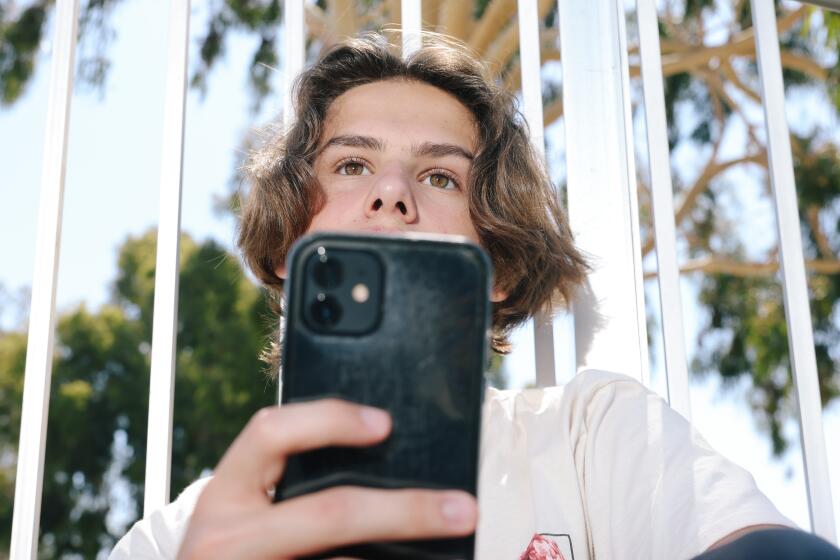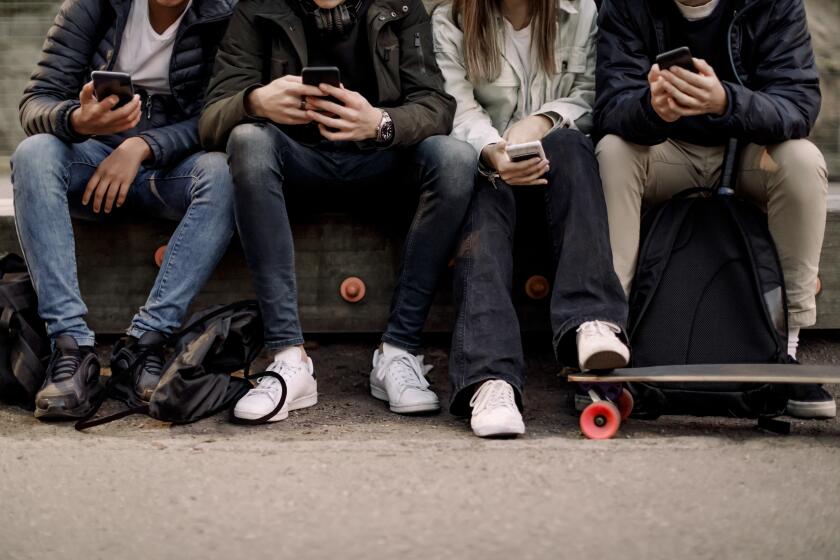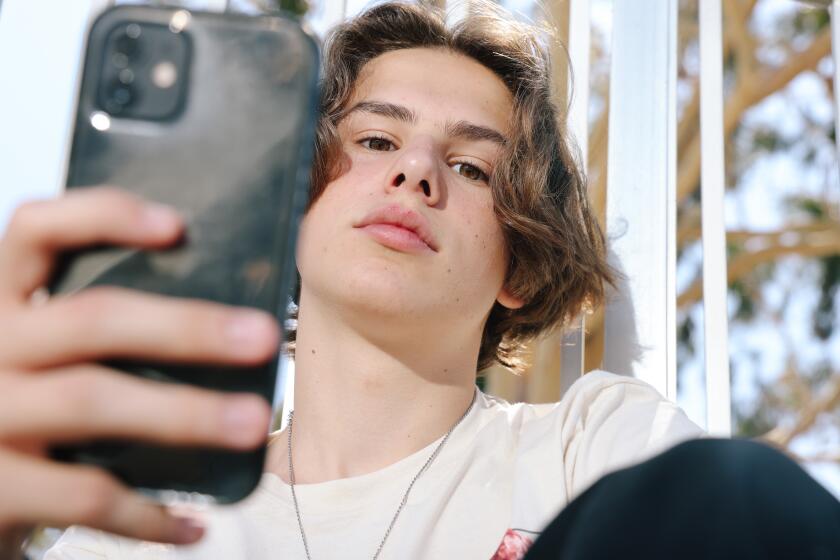Column: Los Angeles school kids, get off your damn phones! Trust me, you’ll thank us later

- Share via
At Venice High School’s recent Back to School night, I was impressed that so many classrooms had signs forbidding students to use their cellphones.
But how, I wondered, do teachers handle kids who break the rule?
“I try not to be punitive,” said my niece’s ethnic studies teacher.
Well, why not? I wanted to ask. Why not just send them to the vice principal’s office the way teachers did in the good old days?
A few days later, my ninth-grader proudly showed me a TikTok dance video that she and her friend made in their math classroom.
“Why were you filming yourselves in class when phones are banned?” I demanded.
“Oh, it was before the bell rang,” she said, “and the teacher said it was OK.”
Seriously? Maybe it’s the teacher who needs a talking-to from the vice principal. (I’m kidding, Mr. P!)
Here’s are the details of California’s Phone-Free Schools Act, approved by lawmakers and sent to Gov. Gavin Newsom. Get ready for a massive change for cellphone-obsessed students.
About a week later, I found myself among hundreds of parents in a Zoom meeting that was billed as a chance for Los Angeles Unified School District parents to discuss the district’s new policy banning smartphones during the school day.
It soon became clear that parents were not being asked whether they support a cellphone ban — the Board of Education passed the resolution in June — but how best to implement it when it takes effect in January. That realization prompted one father to snap, “This whole meeting was stupid and pointless.”
It’s true that the district could have done a better job explaining the meeting’s purpose, but it was valuable to hear what parents think, especially parents who also happen to be teachers, who bemoaned the stress and distraction of policing cellphone use in their classrooms.
L.A.’s principals and teachers need a policy aligned with current research, which shows that curbing phone use in schools leads to better academic performance and less cyberbullying.
“They are not wrong that we didn’t get their input,” L.A. Unified board member Nick Melvoin told me unapologetically this week. Melvoin, a former teacher, spearheaded the resolution. “This is a policy that’s in the best interest of kids and teachers. Every school that has done this says, ‘I wish we’d done this earlier.’ ”
While there seemed to be general agreement that the ban was a positive step, I was surprised by how many parents strongly objected.
Negative reaction ranged from“My child needs her phone at all times to control her anxiety” to, basically, “Over my dead body.” One parent said she didn’t care what the district implemented, she and her child were not going to go along with it.
Sadly and predictably, a lot of the parents fretted about school shootings and the need for kids to be able to let their parents know they’re safe. But let’s be honest, phones don’t make people safe.
California lawmakers are also considering a measure to keep cellphones out of students’ hands while they’re in class. It’s a great idea.
Anyway, said Melvoin, in an emergency “it’s much safer for everyone for kids not to be texting, and for adults to do their job. Part of this is trying to change the culture around addiction to our phones. We want to check in with our kids all the time, but you shouldn’t. They have to develop some independence, and even a vibration in your pocket or book bag distracts you.”
The good news is that L.A. Unified is not alone. Many private schools already ban phones, and a handful of states have adopted no-phone policies.
In August, the California Legislature passed a bill requiring school districts to develop policies limiting the use of smartphones by July 2026.
“Quite frankly, school boards in general need to be pushed into this,” said Democratic state Sen. Ben Allen (D-Santa Monica), a co-author of the bill. “There’s always reasons to drag your feet, but the data shows that phones lead to learning loss, lower scores, increased depression, physical fights, less focus, less ability to learn. We need to shift the culture to a place where this is not acceptable.”
Students, whose cellphones are an extension of their very being, mull pending L.A. school ban of the devices with praise and frustration.
And let me add, this is a problem that extends beyond the classroom door.
Whenever they aren’t in class, kids are on their phones at school, ignoring each other in favor of texting, Snapping and whatever else distracts them from face-to-face interaction.
So, how to get kids off their phones?
Some schools collect phones in the morning using phone lockers, while others supply magnetic pouches that stay in kids’ possession but can be unlocked only at school exits or by teachers and administrators. In a big school like Venice High, Melvoin said, pouches would seem to make the most sense. A pouch for every student would cost the district about $6 million, according to Melvoin, a drop in its $15 billion annual budget. “The return on this investment will be huge.”
The 10-year-old Mar Vista-based company Yondr, a pioneer in the phone pouch field, first created them to free live performers from the distracting and constant use of cellphones in the audience. Many artists have adopted the practice of shutting down cellphones, including Alicia Keys, Guns N’ Roses, the Lumineers, Dave Chappelle and Chris Rock.
Then teachers began reaching out to the company, its director Sarah Leader told me. Now the pouches are being used in thousands of schools in all 50 states and in 27 countries. The company estimates that they will be used by more than 2 million students by the end of this year, double the number at the end of 2023.
“We are not taking something away,” said Leader. “We are giving kids access to a phone-free education.” Yondr works with schools to train staff, and to make sure kids and their parents understand how and why a phone-free day can improve the school experience.
Turns out, there are all kinds of unexpected benefits to getting kids off their phones. Schools that use the pouches are seeing more meals eaten in their cafeterias, Leader said, “because kids feel better about eating when they are not being recorded.” Some schools, she added, report that more books are being checked out of the library.
Banning cellphones in schools won’t solve all the problems wrought by a technology that has gotten way out of hand.
But wouldn’t you agree that it’s a great first step?
More to Read
A cure for the common opinion
Get thought-provoking perspectives with our weekly newsletter.
You may occasionally receive promotional content from the Los Angeles Times.
















